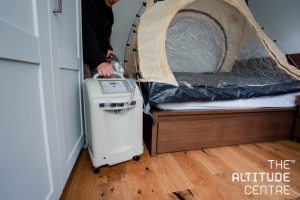Whenever we hear about people wanting to improve their health, the answer that’s put forward is usually to eat better and do a bit more exercise. Indeed, exercise is one of the best things we can do to reduce our risk of developing cardiovascular diseases like coronary heart disease, because it improves the important health markers that contribute to that risk, which we call our blood lipid profile. These are things like blood levels of different cholesterols and insulin, glucose tolerance and often overall body composition. It’s little surprise, then, that when it comes to these health markers elite endurance athletes who spend thousands of hours training every year, tend to record some of the healthiest overall cardio-metabolic health profiles on the planet.

Even in elite athletes, however, things can be improved. What we deem to be ‘good’ results often exist within a range, and often being towards one of that range is better. Elite athletes may only be able to move their scores by small margins, but small improvements really add up across a lifetime, further reducing the risks of experiencing ill health. The question is, however, how can we go about doing this when they are already training as much as possible, and their health data are approaching perfect scores. The answer, like so many things in sport, health and life generally, is altitude training.
New Research
In a study published earlier this month, scientists from Poland studied the effects of two altitude training protocols on the cardio-metabolic health of national level cyclists, and compared those to a control condition in which athletes trained normally at sea level. One of the altitude training groups slept in altitude tents and trained at sea level, whereas the other group slept and lived at sea level, but trained in an altitude chamber. During the 3 week training plan, all the athletes ate the same foods to control the independent influence of diet on these factors.
What Did They Find?
As expected, the elite nature of the cyclists meant that their health markers were all within a healthy range at the start of the study, meaning that their risk of developing cardio-metabolic health conditions was was already low. However, by sleeping at altitude, athletes were able to improve their overall profile such that HDL-C (so called ‘good’ cholesterol) increased by 9.0% and LDL-C (‘bad’ cholesterol) decreased by 18.2% meaning that total cholesterol levels dropped by 9.2%.
Furthermore, plasma triglycerides (the amount of fat in the bloodstream) dropped by 27.6% in the group which slept at altitude only.

What Does This Mean?
The beneficial impact of altitude on cardiovascular disease risk factors has been well investigated, with one recent review concluding that hypoxia offers a promising treatment for these types of health conditions. However, what is encouraging with this new study is that these improvements can still be made even by some of the healthiest people in the world, and if it can improve their health by such large amounts, then you can only imagine what it will do for the rest of us. By improving our cardiovascular health factors, we are reducing the risk of developing cardiovascular diseases, which have only become more commonplace in recent decades. Add to that the well known performance and other health benefits of sleeping at altitude, and we can see that here we have a tool we can use to unlock the very best from ourselves physically.
You can read the study online here, or to find out more about how altitude training can work for you, contact the team below.
